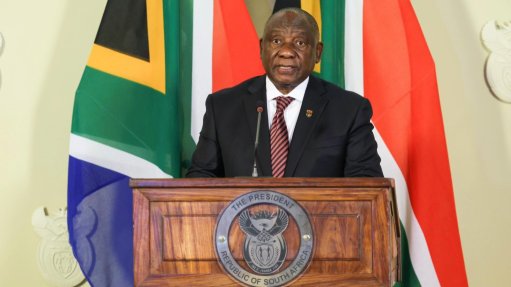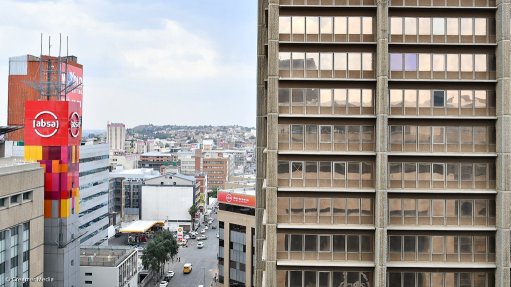Africa can increase natural gas supply, exports to Europe
Export capacity constraints currently hamper some African countries from increasing their exports of natural gas and liquefied natural gas (LNG) and, while exploration has dropped off, new gasfield discoveries present an opportunity for Africa to grow the supply of natural gas to Europe, said energy industry experts during the 'Energy in Africa' think-tank discussion this week.
Natural gas, as an energy transition fuel, is available in Africa. It also has multiple industrial uses, burns significantly cleaner than other carbon sources, such as coal or oil, and has a suitable export market, especially since the start of the Russia-Ukraine crisis, said consulting and market research multinational Frost & Sullivan Africa energy and power consultant Patrick Prestele on July 14.
"A key problem is the limited investment opportunity at the moment. The European Commission will not fund carbon-related technologies, but has declared natural gas and nuclear power as sustainable under its rules. It will be interesting to see how this changes the investment landscape in Africa in the short term," he said.
Africa is a particularly carbon-intensive region when it comes to oil and gas production, owing to limited infrastructure compared to oil and gas infrastructure platforms in developed countries.
However, there are various carbon abatement mechanisms that can be imposed through policy, and through international oil and gas majors reducing their carbon footprints, such as through reinjection of gas into depleted wells and the reduction of flaring, as well as new technologies to reduce carbon footprints of fossil fuels, said market intelligence firm Welligence Energy Analytics VP and Africa research head Derek Boulware.
However, over the past few years, compounded by the impact of the Covid-19 pandemic, there has been a reduction in exploration on the continent.
There is potential for Africa to leapfrog from fossil fuel power sources to clean alternatives, but this is a longer-term process, which is why gas is spoken about as a transition fuel. It is important to have gas and this needs funding to enable it, said financial services firm Standard Bank Group natural resources, business and commercial clients executive head Berrie de Jager.
Additionally, the debate about the use and financing of gas is not only about the molecules, but about the value chain to get the product to market. This means that the question about financing is much broader than only funding of gas projects, he added.
"In some markets there is adequate support for natural gas projects to proceed. There will be demand for gas in Africa, such as [South African State-owned power utility] Eskom investigating establishing new gas-fired power plants in KwaZulu-Natal, with the Integrated Resource Plan 2019 looking at 3 GW of gas coming online," he said.
"There will be demand for gas, but the answer to funding probably sits in a public and private sector partnership. There are equity pools available that are prepared to inject money, and the commercial model around gas is good and it presents an opportunity to help the world progress towards net-zero," De Jager said.
Europe is procuring significant volumes of gas resources from Africa. A challenge in the short term, with LNG being the easiest to export to the European market, is that Africa is at capacity currently, said Boulware.
"In the medium term, this suggests that there would be the opportunity to fulfil more European gas demand with African LNG. For example, in Nigeria, there are six operating LNG trains and there has been a final investment decision made on a seventh and, when it comes online, it can contribute to export growth," he said.
In Angola, there are some non-associated gas finds that may be able to contribute to Angola's LNG industry in the medium term.
However, the largest change in LNG output is expected from Mozambique, although the Rovuma Basin LNG project has been under force majeure owing to militant attacks in the country. Currently, the project is looking to start up in 2024, and may add significant volumes of LNG that can potentially be redirected to Europe.
Further, the Coral South offshore project in Mozambique is coming online and introduced the first molecules to its plant during the past month, although most volumes are precontracted, he added.
Projects in Mauritania and Senegal, which present benefits in terms of proximity to Europe, will only add gas over the medium term, Boulware said.
"There is interest from Europe in procuring more gas from Africa, given the geographical convenience, but we need to up the output to make a bigger contribution," he said.
Welligent is currently tracking 101 opportunities in sub-Saharan Africa for commercial oil and gas assets that the company believes could be transactable, with some partners wanting to exit and others to divest a portion of their interest, especially in early life assets, said Boulware.
"There have been lots of new discoveries, such as in Côte d'Ivoire and Namibia, but developers are tending to partner with other investors to develop these assets."
There are also interesting opportunities in Southern Africa, where ASX-listed oil and gas company Invictus Energy will drill a well in its Mukuyu prospect, in Zimbabwe, in August. Oil major Mobil did seismic work in Zimbabwe in the 1970s, discovering that gas is likely present, but did not move forward with the project, said Boulware.
Additional seismic studies have upgraded the estimated gas resource from 0.85 trillion cubic feet (tcf) to 20 tcf, he added.
"Another trend we are seeing is that lots of oil and gas majors are looking to exit Africa, but this presents opportunities for smaller independent companies to pick up assets, including nascent and dormant assets, and breathe new life into them.
"We are tracking opportunities and it is interesting that the transition is not only in terms of energy but also away from major companies at the helm to smaller, independent players entering the market," Boulware said.
Article Enquiry
Email Article
Save Article
Feedback
To advertise email advertising@creamermedia.co.za or click here
Press Office
Announcements
What's On
Subscribe to improve your user experience...
Option 1 (equivalent of R125 a month):
Receive a weekly copy of Creamer Media's Engineering News & Mining Weekly magazine
(print copy for those in South Africa and e-magazine for those outside of South Africa)
Receive daily email newsletters
Access to full search results
Access archive of magazine back copies
Access to Projects in Progress
Access to ONE Research Report of your choice in PDF format
Option 2 (equivalent of R375 a month):
All benefits from Option 1
PLUS
Access to Creamer Media's Research Channel Africa for ALL Research Reports, in PDF format, on various industrial and mining sectors
including Electricity; Water; Energy Transition; Hydrogen; Roads, Rail and Ports; Coal; Gold; Platinum; Battery Metals; etc.
Already a subscriber?
Forgotten your password?
Receive weekly copy of Creamer Media's Engineering News & Mining Weekly magazine (print copy for those in South Africa and e-magazine for those outside of South Africa)
➕
Recieve daily email newsletters
➕
Access to full search results
➕
Access archive of magazine back copies
➕
Access to Projects in Progress
➕
Access to ONE Research Report of your choice in PDF format
RESEARCH CHANNEL AFRICA
R4500 (equivalent of R375 a month)
SUBSCRIBEAll benefits from Option 1
➕
Access to Creamer Media's Research Channel Africa for ALL Research Reports on various industrial and mining sectors, in PDF format, including on:
Electricity
➕
Water
➕
Energy Transition
➕
Hydrogen
➕
Roads, Rail and Ports
➕
Coal
➕
Gold
➕
Platinum
➕
Battery Metals
➕
etc.
Receive all benefits from Option 1 or Option 2 delivered to numerous people at your company
➕
Multiple User names and Passwords for simultaneous log-ins
➕
Intranet integration access to all in your organisation


















